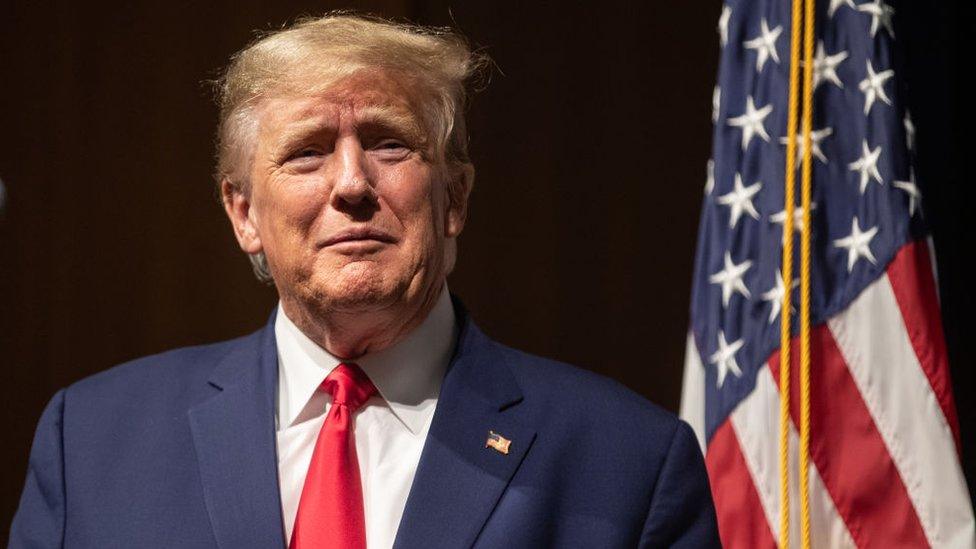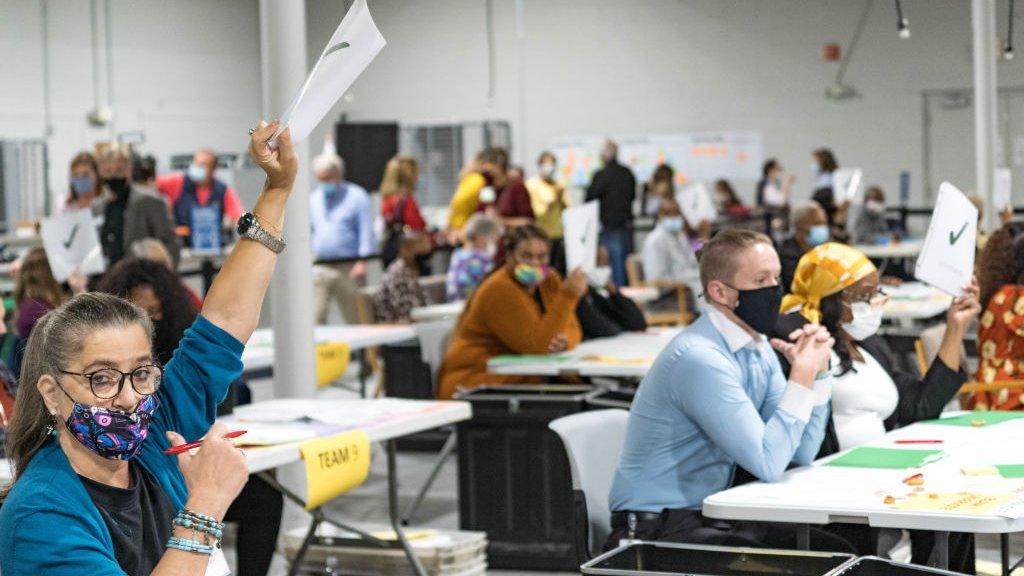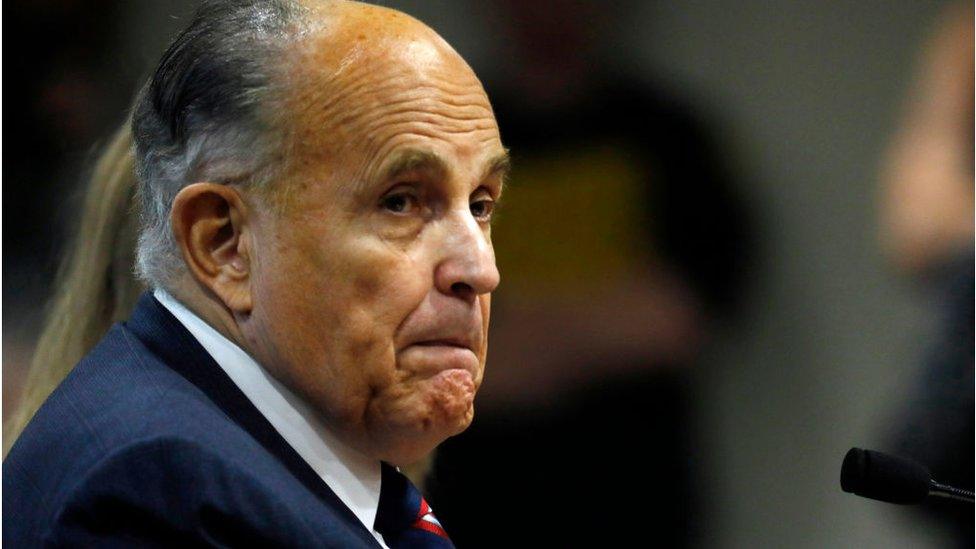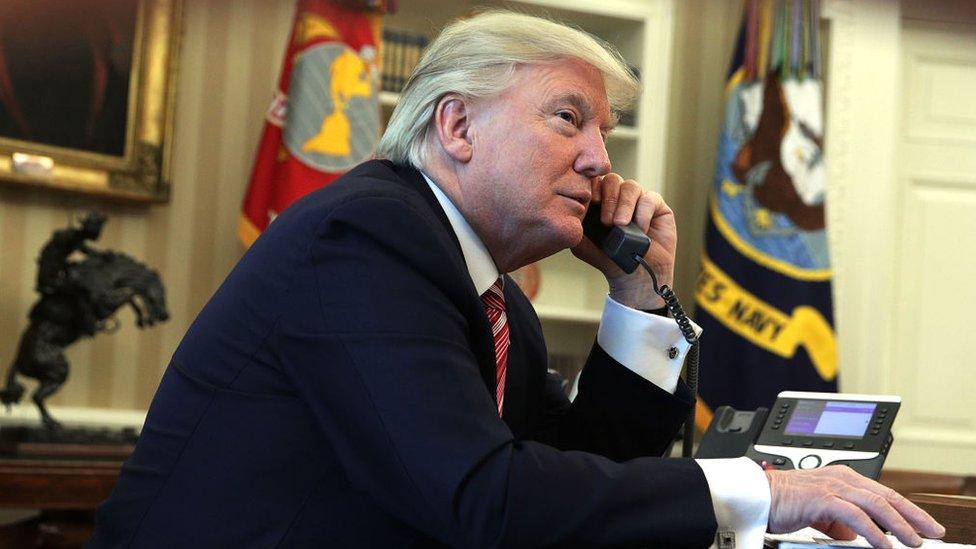Georgia grand jury report: Witnesses may have lied in Trump 2020 election probe
- Published

Former President Donald Trump and his allies are being investigated in Georgia for their efforts to overturn his loss in the state
A Georgia judge has released parts of a highly anticipated report on whether former President Donald Trump and allies broke the law in their attempts to overturn his election loss.
The report summarises a two-year grand jury probe into their conduct after Mr Trump narrowly lost the state in 2020.
It says the grand jury believes some witnesses - who weren't named - committed perjury by lying under oath on the stand.
Mr Trump was never asked to testify.
But dozens of witnesses, including several prominent Republicans, were interviewed by the special grand jury.
Much of the brief report - pages two through to seven - remains hidden from the public. Only its introduction, conclusion and a section detailing perjury concerns were unsealed on Thursday.
The latter section states: "A majority of the Grand Jury believes that perjury may have been committed by one or more of the witnesses testifying before it."
The unsealed portions of the report do not reveal which witnesses may have lied under oath.
The 26-member panel also rejected false claims from Mr Trump that the election had been rigged, saying it found "by a unanimous vote that no widespread fraud took place in the Georgia 2020 presidential election that could result in overturning that election".
The grand jury cannot issue indictments itself, but it can recommend that the county's district attorney Fani Willis - whose office launched the investigation - bring charges.
Ms Willis, a Democrat, has promised to have a decision soon. If charges are filed, it is at that point that the public will learn more about the evidence the prosecution has to support its case.
To date, no formal charges have been brought against Mr Trump or any of his associates, and no former president has been indicted in US history.
Mr Trump wrote on his Truth Social platform on Thursday that the unsealed portions of the report "have nothing to do with the President because President Trump did absolutely nothing wrong". He pledged to "always keep fighting for true and honest elections".
Mr Trump lost to Joe Biden by 11,779 votes in the state of Georgia in 2020.
The grand jury probe into his post-election conduct was sparked by an hour-long phone call in January 2021 between Mr Trump and Georgia Secretary of State Brad Raffensperger, during which the then-president asked Mr Raffensperger to "find" the exact number of votes he needed to flip the results in his favour.
Donald Trump: "I just want to find 11,780 votes"
The investigation expanded over time to include false claims of election fraud made to state lawmakers, as well as a scheme to send an alternate slate of Republican electors who met at the Georgia Capitol and signed statements falsely claiming Mr Trump had won that state.
Mr Trump - who continues to deny the 2020 presidential election results - has called the probe a "political witch hunt" and maintained his call with Mr Raffensperger was "perfect".
The grand jury interviewed 75 witnesses before it was dissolved last month, including Mr Trump's former personal attorney Rudy Giuliani, Georgia Governor Brian Kemp and South Carolina Senator Lindsey Graham.
After parts of the report were unsealed, Mr Graham told CNN he was confident in the testimony he gave and said he hadn't heard from the district attorney's office since appearing before the jury.
The grand jury probe was carried out while US lawmakers were also probing Mr Trump and his allies' attempts to overturn the election.
A select US House of Representatives committee published a more than 800-page report last year concluding that Mr Trump had incited the 6 January 2021 riot, when his supporters stormed the Capitol as lawmakers met to formalise Mr Biden's victory.
Related topics
- Published10 February 2021

- Published16 August 2022

- Published24 January 2023
